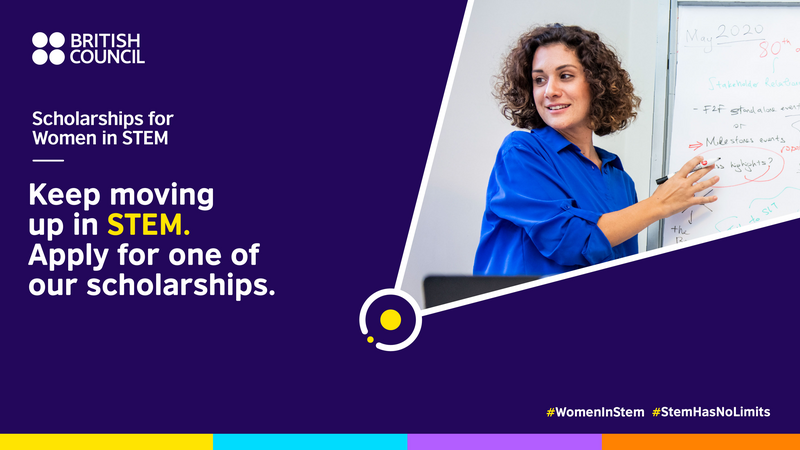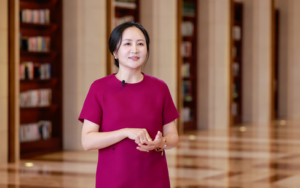British Council scholarships continue to support women in STEM

The British Council is pleased to announce the scholarships for women in STEM are back for a second year. The scholarships will support over 100 women from around the world in continuing their STEM studies at a university in the United Kingdom (UK).
The British Council Scholarships for Women in STEM support women wishing to pursue postgraduate study in science, technology, engineering or maths at a university in the UK.
This prestigious scholarship will allow over 100 women from selected countries including from South Asia, East Asia and the Americas to obtain a Master’s degree or an Early Academic Fellowship from a university in the UK, giving them the opportunity to further develop their careers in STEM subjects.
In partnership with 26 universities across the UK, this scholarship scheme includes tuition fees, a monthly stipend, travel costs, visa and health coverage fees. The scholarship is also open to women with dependents to apply, with extra support available.
During his visit to Sri Lanka, Lord (Tariq) Ahmad of Wimbledon, Minister of State for South and Central Asia, United Nations and the Commonwealth, in discussion with British Council along with four outstanding women scholars in various fields of STEM study and representing the British Council Commonwealth Futures climate research cohort, stated, ‘The UK Government is clear, that the underrepresentation of women in STEM fields not only denies talented women opportunities, it holds back societies, and the sum total of human understanding. For the second year running, the British Council has launched a Master’s Scholarship Programme in partnership with 26 UK universities. Our scholarships build on our belief, that giving opportunities to committed and talented individuals benefit us all. By supporting education, particularly of underrepresented groups, we strengthen links and understanding between us, and build a brighter future for us all.’
According to data from the UN Scientific Education and Cultural Organization (UNESCO), fewer than 30 percent of researchers worldwide are women and only 30 percent of female students select STEM-related fields in higher education. As a typical STEM worker earns two thirds more than non-STEM workers, giving women equal opportunities to pursue STEM careers helps narrow the gender pay gap and would be a major contribution to the achievement of Sustainable Development Goal 5: achieve gender equality and empower all women and girls.
Dr Iroja Caldera, senior lecturer and attorney at law, commented on the opportunities created through her journey in STEM higher education,’ Firstly, you get the opportunity to study at a globally high ranked university and thereby have access to state of the art expertise and resources. Secondly, you are able to enhance your personal and professional skills, this skill set is valuable as you start out your career. The exposure received by studying abroad, will help you to move out of your comfort zone and this greatly contributes to one’s personal growth. Finally, the opportunity to network and build lasting personal and professional connections is instrumental to inculcate fruitful collaborations and opportunities in later years.’
Sri Lanka is leading in gender – equal education among its parallel countries in the developing world. Enrolment and completion in primary education among girls and boys are on par, whereas girls have higher retention rates in secondary and higher education levels. Sri Lanka has considerable achievements in gender representation across the different fields in science, technology, engineering, and mathematics. According to the University Grants Commission, Sri Lanka females accounted for 49% of undergraduate enrolments in STEM subjects in local universities in comparison to current global average of 35% in 20184
Emphasizing the significant role played by the British Council in providing opportunities to access world-leading UK expertise in STEM and support underrepresented women, Maarya Rehman Country Director British Council Sri Lanka said, ‘Although Sri Lanka is notably ahead in gender-equality within primary and secondary levels of education, cultural and social norms as well as negative stereotypes tend to hamper women and girls from pursuing further education in STEM related fields. For example, at the undergraduate level 74% of females are enrolled in allied health science and 60% in medicine compared to only 24% in engineering and physical science streams.4 Similarly, in technology related streams women participation is comparatively low. The UK has a world-renowned higher education sector that is truly international. These scholarships will enable talented women to take up a life-changing opportunity to develop their careers in their chosen STEM fields, and then harness the experience to make a greater impact for good when they return home.’
For more information, including a full list of participating UK universities and available courses, please visit:
www.britishcouncil.org/study-work-abroad/in-uk/scholarship-women-stem
Applications for the British Council Scholarships for Women in STEM are open until end of March 2022.
About British Council
The British Council is the UK’s international organisation for cultural relations and educational opportunities. We build connections, understanding and trust between people in the UK and other countries through arts and culture, education and the English language. Last year we reached over 67 million people directly and 745 million people overall including online, and through broadcasts and publications. Founded in 1934 we are a UK charity governed by Royal Charter and a UK public body. We receive a 15 per cent core funding grant from the UK government.
ENDS







